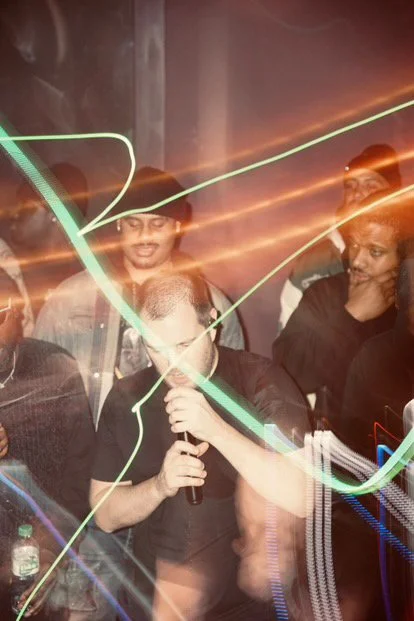Inside 0121: Birmingham's Underground Music Scene is Calling…
Brummies are crafting their own foundations for a music movement built on sweat, sound, and subversion—right where the Villa and Blues play.
Forget London for a minute. Let's go on a trip to the West Midlands. Picture this: we jaywalk too soon, darting past the crossing as the red man glares at us, juggling an industrial-sized camera and a bulky tripod. The Fiat that nearly runs us over honks its disapproval. It's the coldest night of the year so far. We arrive at what we assume is the venue, Chinawhite, and are quickly approached by a guy in blacked-out shades.
"Are you guys here for Devsz?"
"Uhh..." I reach for my phone. "I'm interviewing the guy performing. nineteen97?"
"Yeah, that's him. I'm Ping, his manager." After a few brief introductions, we're ushered inside, past staircases and doors, until we're seated on velvet sofas next to a terracotta army. Two DJ booths are set up on either side of us. Devsz is running late. I start fiddling with our borrowed equipment.
"That's a big camera," retorts a familiar voice behind me—one that's normally layered over eclectic UK garage beats. Mike Skinner (aka The Streets) sits across from me, black puffer zipped to the top. I am face to face with one of the biggest icons of Birmingham's rap scene. Despite dropping Original Pirate Material in 2002 and moving to London after skyrocketing to stardom, Skinner hasn't forgotten his roots.
After a recent release—"Different Kind of Trap"—with Local Boy Devsz, aka nineteen97, he's back to perform a 97p-priced show in his hometown. His stage name, a tribute to his birth year, inspired the ticket price.
Our interaction with Mike is fleeting and slightly awkward. I ask a couple of questions about his collaboration, but he isn't in the mood for an interview. "I'm just here for the Wingstop, really," he shrugs before excusing himself to practice his lyrics. It wasn't much, but the encounter felt oddly fitting—like a subtle nod from one of the godfathers of Brum's underground.
Devsz arrives shortly after, exuding relaxed confidence. Sporting retro shades, a green Kith jumper and a Dukes Cupboard cap, he leads us behind one of the booths to commence the interview. "Getting The Streets down in Birmingham for 97p… Where else can you see things like this happen?"
Devsz asks in between bites of Wingstop, a sponsor of the show. "Mike's booking agents were onto me," he continues. "I could have made a shit ton of money off this day, but for the sake of the city, I was like, 'forget that'. I wanted to show people it's achievable."
Devsz only started making music as a rapper during the COVID lockdown but had already left his mark on the UK music scene as a designer, working with Jaykae, M1llionz, and Skepta. His music combines introspective lyrics with beats bridging old-school grime, garage, and melodic sounds.
Aesthetics plays a major role in his work, as he designs his own cover art and tour visuals while maintaining a sharp fashion sense. "We've spearheaded this subculture that wasn't here before," he explains. "This partially mainstream, partially underground crossover. We don't know what to call it. Me and my friends just call it grit."
Though new, this 'grit' has materialised into a booming scene in Birmingham, encompassing artists like Kofi Stone or Blue Room Mafia (R.I.P). It differs from the rap and grime of early 2000s Birmingham, with artists focusing on both music and fashion—think vintage streetwear, football jerseys, and bold graphics.
“Musically, Birmingham’s scene is carving out its own identity, distinct from London’s grime and rap cliques. It embraces unpolished energy and imperfections, a rawness that’s both its charm and edge. However, unlike London, Birmingham’s artists often rely on DIY approaches due to the lack of big labels or agencies. ”
Katus Myles, an emerging R&B artist, adds to this narrative. "Talent-wise, it's all out there in Birmingham," he says while stationed on a graffiti-clad bridge by Custard Factory in Digbeth, Birmingham's 'Shoreditch'. "But you might drop something amazing and feel like it's pointless if no one hears it. Rather than letting that pull me back, it drives me more."
Our conversation follows his album-listening party at Bene Culture, an intimate affair blending music and fashion. The crowd swayed to tracks from his upcoming EP Winter Arc: Noir amidst racks of streetwear by local designers. His smooth lyrics and suave beats reflect his inner-city upbringing. "It's a raw vibe," he states. "If you can make it in Brum you can make it anywhere."
izeforshort ['eyes', for short], a self-taught DJ and producer, is another key player in Birmingham's underground. Deeply inspired by his Jamaican heritage and the unpolished nature of his hometown, he recently performed with Amsterdam-born Jyoty at a Calm International event. He'd been the one to invite me to Katus's listening party, where he spun tracks while sipping Wray & Nephew.
"The underground scene here means everything," he says passionately. "If we keep working together and build more infrastructure, people will be less likely to think they have to leave the city for places like London." Recalling the camaraderie at events like the city's carnival, he emphasises that the sense of community defines Birmingham's music culture.
Tom Eagles, the co-founder of Sigil Radio, echoes this sentiment. Launched in May 2024, the independent radio station amplifies emerging artists through residencies and one-off slots. "It feels like we're at a turning point for Birmingham music," Tom reflects. "There wasn't really a focal point for the more electronic side before."
Sigil Radio has hosted numerous local artists, including ize and grime musician Mayday, who recently went viral for a clip from one of his Sigil sets, where he boldly asked: 'How can I take investment advice from a man with artwork made on Canva?' The station's hands-on approach includes producing high-quality recordings and offering promotional support. "Being a part of a community is what makes it exciting," Tom adds. "We know the residents, so we can plan future sets or nights together."
Steffan Taylor, head promoter at Artum, agrees. With a decade of experience in Birmingham's music world, he's created spaces for grassroots artists. "Birmingham has a fantastic music scene," he affirms. "It's a big city with a small culture. You'll often bump into people you've met in clubs and events."
Artum's events at Hockley Social Club showcase the area's diversity, from reggae and ska to amapiano and grime. Despite setbacks from COVID, they're determined to drive a thriving nightlife. "Birmingham has always been a big player in the UK music scene," Steffan shares. "I'd love to see more of that."
The interconnected web of creatives—from Devsz and Katus to ize, Tom, and Steffan—highlights what makes Birmingham's underground so unique. Built on collaboration and a love for authentic expression, the gritty spirit is the heart of the city's music culture. Mike Skinner's presence that night feels symbolic. If anyone understands the tribulations of putting Birmingham on the map, it's him. And there he was, lending his name to the next generation.
"If you look through my old tweets, you'll see me talking about The Streets, saying 'Oh my God, I love 'Blinded by the Lights'," Devsz laughs. "There's a gap that's being bridged here. My role is to show people it can be done." Mr Vegas said it best: 'Big up the Birmingham Crew'.
Wanna hear more from the 0121? Stream the playlist below:



